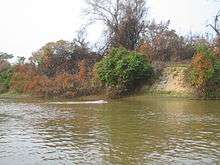Bolivian river dolphin
| Bolivian river dolphin | |
|---|---|
 | |
| Scientific classification | |
| Kingdom: | Animalia |
| Phylum: | Chordata |
| Class: | Mammalia |
| Order: | Artiodactyla |
| Infraorder: | Cetacea |
| Family: | Iniidae |
| Genus: | Inia |
| Species: | I. geoffrensis |
| Subspecies: | I. g. boliviensis |
| Trinomial name | |
| Inia geoffrensis boliviensis d'Orbigny, 1834 | |
The Bolivian river dolphin (Inia geoffrensis boliviensis), a mammal, is a subspecies of the Amazon river dolphin. Although older publications and some recent publications[1][2] consider the I. g. boliviensis population as distinct species from Inia geoffrensis, much of the scientific community, including the IUCN,[3] consider them to be a subspecies of Inia geoffrensis. Current classification,[4] therefore, considers them a single species, Inia geoffrensis, in the genus Inia, with three recognized subspecies. However, in 2012 the Society for Marine Mammalogy[5] began considering the Bolivian (Inia geoffrensis boliviensis) and Amazonian (Inia geoffrensis geoffrensis) subspecies as full species Inia boliviensis and Inia geoffrensis. A recent study of mitochondrial DNA sequences gave an estimated time of divergence from I. geoffrensis geoffrensis of 2.9 million years ago, strengthening the argument for separate species status.[2]
In September 2012, Bolivian President Evo Morales enacted a law to protect the dolphin and declared it a national treasure.[6]


French naturalist and palaeontologist Alcide Dessalines d'Orbigny explored South America from 1826–1833, including a stay in Bolivia from 1831–1833. He returned to France in 1834 and started to describe his scientific explorations, including the new Bolivian cetacean species "Inia boliviensis". In 1847, he and Paul Gervais compared it to "Delphinius geoffrensis" (=Amazon river dolphin, Inia geoffrensis), which had been described from a stuffed specimen in Lisbon, and the two were considered synonyms for more than a century. In 1973, however, a fresh study concluded that the specimens from Bolivia had more teeth than the specimens from elsewhere and that the rapids and water falls of the Madeira River acted as a barrier, effectively isolating the Bolivian population. The Bolivian river dolphin was therefore made a subspecies, Inia geoffrensis boliviensis. Morphological studies later in the 1970s added to the differences between the populations and the specific status Inia boliviensis was restored. There is, however, still no consensus on the taxonomic status of the Bolivian population (or that of the Orinoco River population, "I. g. humboldtiana").[7]
References
- ↑ Martínez-Agüero, M.; S. Flores-Ramírez & M. Ruiz-García (2006). "First report of major histocompatibility complex class II loci from the Amazon pink river dolphin (genus Inia)" (PDF). Genetics and Molecular Research. 5 (3): 421–431. PMID 17117356.
- 1 2 Hrbek, Tomas; Da Silva, Vera Maria Ferreira; Dutra, Nicole; Gravena, Waleska; Martin, Anthony R.; Farias, Izeni Pires (2014-01-22). Turvey, Samuel T., ed. "A New Species of River Dolphin from Brazil or: How Little Do We Know Our Biodiversity". PLOS ONE. 9: e83623. doi:10.1371/journal.pone.0083623. PMC 3898917
 . PMID 24465386.
. PMID 24465386. - ↑ R.R. Reeves; T.A. Jefferson; L. Karczmarski; K. Laidre; G. O'Corry-Crowe; L. Rojas-Bracho; E.R. Secchi; E. Slooten; B.D. Smith; J.Y. Wang & K. Zhou (2011). "Inia geoffrensis". IUCN 2011. IUCN Red List of Threatened Species. Version 2011.2. International Union for Conservation of Nature and Natural Resources.
- ↑ Rice, D. W. (1998). Marine mammals of the world: systematics and distribution. Society of Marine Mammalogy Special Publication Number 4. p. 231.
- ↑ Committee on Taxonomy. 2012. List of marine mammal species and subspecies. Society for Marine Mammalogy, www.marinemammalscience.org, consulted on May 6, 2012.
- ↑ "Bolivia enacts law to protect Amazon pink dolphins". BBC News. 18 September 2012.
- ↑ Robineau, Daniel; Buffrénil, Vivian, de (2003). "Early descriptions of whales: D'Orbigny, A. 1834. Note on a new cetacean genus, from the rivers of the central part of South America. [Notice sur un nouveau genre de cétacé, des rivières du centre de l'Amèrique méridionale. Nouvelles annales du Muséum d'histoire naturelle, 3:28–36].". The Journal of Cetacean Research and Management. IWC. 5 (3): 209–212. Retrieved December 2013. Check date values in:
|access-date=(help)